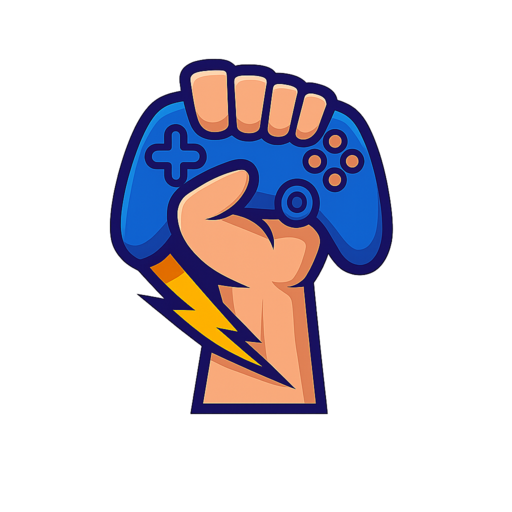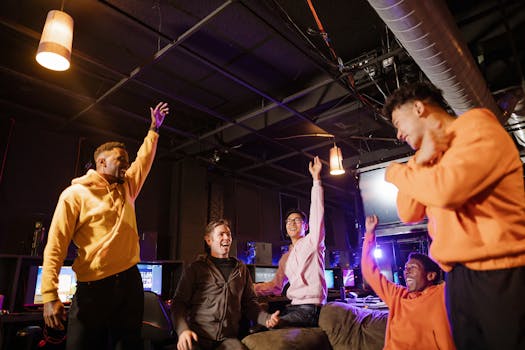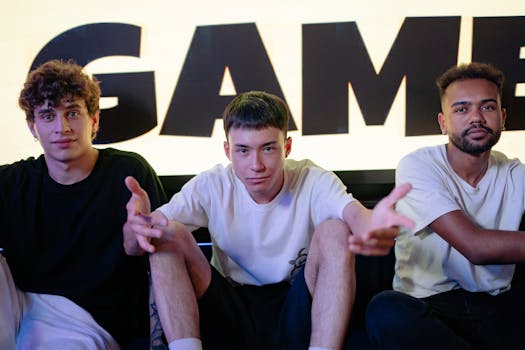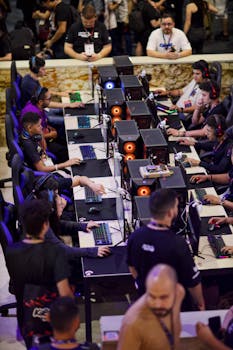Anúncios
You’ve probably noticed how a group of gamers manages to accomplish incredible feats together—sometimes without a single word spoken. That’s the magic of organic gaming teamwork unfolding in real time, where communication seems to transcend language barriers entirely.
Gaming teamwork matters far beyond the screen. In workplaces or classrooms, coordinated actions and strategic planning directly mirror skill sets learned through gaming: reading signals, predicting peers’ moves, and adapting quickly to shifting objectives.
Curious about which in-game practices really foster strong teamwork and sharp strategy skills? Let’s explore these ideas, dig into real examples, and break down tactical steps you can use and observe—even offline.
Collaborative Communication Cultivates Real Results
Gamers learn that single actions rarely drive success—the seamless interplay between players makes the magic happen. Practicing gaming teamwork transforms passive spectators into active contributors whose decisions directly impact team outcomes.
Effective communication develops naturally in gaming’s fast-paced environments. Players learn to signal intentions, coordinate maneuvers, and adapt strategies without confusion, making every message count when timing is critical.
Contextual Clues Guide Group Decisions
Audio cues such as “Cover left!” or “I need healing!” give team members clear, actionable information. When teammates react promptly, missions stay on track, and everyone benefits from increased clarity and quick adaptation.
Body language in virtual worlds—like sudden turns, crouches, or weapon switches—serves as shorthand for new plans. Teams attuned to these signals operate more efficiently, even without voice chat, demonstrating silent but powerful forms of gaming teamwork.
Effective squads use visual markers or pings to direct attention swiftly. By sharing focus instantly with a click, players reduce misunderstandings. This practice trains fast mutual awareness, a skill essential in collaborative real-life tasks.
Role Assignment Streamlines Team Performance
Dividing tasks by in-game roles—tank, support, scout—mirrors workplace delegation. Each teammate contributes distinct strengths, enhancing collective performance. Clear expectations mean fewer conflicts and smoother teamwork from planning to execution.
Rotating roles encourages understanding and empathy. When a strategist fills a scout’s shoes for a round, respect for others deepens. Adapting to new roles exercises mental flexibility and fortifies gaming teamwork overall.
Role-responsibility scripts (“You focus on defense, I’ll handle recon”) reinforce accountability. Clear job assignments help teams respond to setbacks with stronger cohesion and less finger-pointing, regardless of outcome.
| Communication Type | Usage Example | Team Impact | What to Try Next |
|---|---|---|---|
| Voice Command | “Flank right now!” | Instant reaction | Set auto-commands for key plays |
| Text Chat | “Retreat, regroup!” | Coordinates resets | Use short, clear phrases under pressure |
| Pings/Markers | Marking targets | Highlights threats fast | Practice snap-pinging in matches |
| Emotes/Symbols | Wave, crouch spam | Non-verbal cues | Notice silent teammate signals |
| Replays/Reviews | Post-game analysis | Enhances future teamwork | Debrief using team footage |
In-Game Leadership Teaches Real-World Decision Skills
Confident leaders make the difference between success and chaos, especially during intense rounds. Games train players to recognize when to step up, organize others, and adjust direction under pressure.
They also show the value of knowing when to delegate—a skill as crucial in gaming teamwork as in business or school projects. Delegation builds trust and lets every team member shine.
Command Calls Drive Rapid Team Action
Designating a shot-caller in-game lets everyone react together during critical moments. Concise commands—like “rotate left” or “plant now”—practice group discipline and improve overall team effectiveness with lightning speed.
- Take point in voice chat during matches: ensures coordination when split decisions are needed, avoids double-assigning tasks, and helps shy teammates get involved.
- Limit directives to essentials: keeps communication clean, reduces confusion in firefights, and teaches concise workplace communication.
- Praise prompt responses: reinforces fast listening and encourages quicker group adaptation, whether winning or needing to change tactics on the fly.
- Set backup plans before matches start: rewards pre-planning, keeps morale up if the first plan fails, and streamlines recovery from mistakes.
- Rotate leadership each round: exposes everyone to new perspectives, builds well-rounded team members, and exercises resilience in changing situations.
Applying these leadership cues outside of gaming—like in project meetings—helps groups stay focused and adaptable. Continual rotation fosters respect for everyone’s approach and nurtures stronger gaming teamwork everywhere.
Debriefing Sessions Build Shared Growth
Post-match reviews create safe spaces for honest feedback. Reframing errors as learning opportunities encourages self-reflection and better performance in future rounds—both in and out of the game world.
- Analyze team decisions in replay mode: spot where communication faltered, highlight moments of seamless teamwork, and discuss next step improvements together.
- Focus on problem-solving, not blaming: reduces defensiveness, improves future gaming teamwork, and models constructive group criticism.
- Highlight exceptional plays: celebrates what went well, motivates repetition of best strategies, and strengthens team morale after both wins and losses.
- Assign each member to summarize one team highlight: fosters active listening, shares responsibility, and reinforces everyone’s contributions to the match outcome.
- Set simple improvement goals for the next session: brings actionable focus to practice, fuels steady growth, and tracks overall effect on gaming teamwork dynamics.
Group debriefing translates smoothly to real work: after action reviews in teams benefit from these gaming-derived mental routines centered on collective learning and responsibility.
Strategic Planning Happens Every Second in Matches
In fast-paced matches, players constantly analyze evolving situations and recalibrate tactics as new threats appear. This improvisation trains mental agility and sharpens strategic thinking every round.
Gaming teamwork thrives on collective decision-making. Teams gain an edge by pooling ideas and agreeing on an action plan that adapts as in-game variables shift from moment to moment.
Risk Assessment Fuels Winning Tactics
Communicating risk—”risky push?” or “wait for respawn?”—lets teams weigh consequences together. This builds smart, real-world habits for evaluating when to act and when to hold back to avoid setbacks.
Teammates who share honest risk opinions (“It’s too early for that move”) foster a transparent environment. Disagreements become discussions instead of arguments, which helps group strategy mature faster.
Success hinges on learning from each risky decision. Whether the gamble pays off or not, reviewing why a tactic was chosen together builds collective wisdom for tighter gaming teamwork down the line.
Adaptive Playstyles Counter Opponents
Reacting flexibly to unfamiliar team compositions or new patch rules keeps a group’s approach fresh. Teams discuss adjustments like “switch to zone defense” and teach each other to outmaneuver fast-changing threats.
Mimicking an opponent’s surprise tactic—”Let’s try their left flank rush”—tests adaptability while keeping the group thinking creatively. Success in these moments comes from whole-team brainstorming and mutual trust in action.
Gaming teamwork flourishes when players shift strategies as a unit. This shared adaptability, practiced online, prepares groups to handle unexpected challenges anywhere collaboration is required.
Conflict Resolution Styles Strengthen Bonds
Managed calmly, disagreements over gaming teamwork become stepping stones to growth. Players develop healthy communication habits by seeking understanding rather than assigning blame when clashes arise mid-game.
Solving disputes helps reinforce group cohesion, especially when emotions run high after defeat. Overcoming challenges together forges resilience, enabling long-term improvement both offline and in the next match.
Active Listening Reduces Tension
During heated moments, repeating a teammate’s concern (“You wanted backup sooner?”) signals respect for different viewpoints. Acknowledging each player’s input defuses arguments and keeps sessions constructive.
Practicing reflective listening—”So you mean try a slower push next round?”—ensures misunderstandings don’t linger. These moments crystallize the rules for calm debate, paving the way for smoother gaming teamwork over extended play.
Open acknowledgement—”Thanks for your honesty”—encourages quieter voices and balances dominant personalities in the group. Over time, better listeners build stronger partnerships and collective decision quality.
Repair Rituals Bring Teams Back Together
Quick gestures like “Sorry for that bad call!” or using a light-hearted emote to admit fault reset the group’s mood fast. These repair rituals, modeled in-game, teach social skills needed in workplace collaboration.
Establishing ground rules—”Let’s not dwell after each round”—manages emotional fallout after tough losses. This habit, developed in gaming teamwork, empowers teams to reset focus efficiently for future tasks.
Recognizing improvement—”You’ve been awesome at backing me up tonight”—reinforces desired group behaviors. Teams who give positive feedback stay more motivated to support each other, even after friction.
Role Specialization Sharpens Group Results
Assigning clear roles gives structure to gaming teamwork, letting individuals show off their expertise while reducing confusion in the heat of the moment. Specialization fuels both pride and responsibility in team play.
Consistently switching roles each session expands individual skillsets and awareness. Teams who embrace flexible role-taking see marked improvements in overall performance, communication, and rhythm.
Main Roles and Their Impact
The support player keeps the whole team moving, dropping heals or buffs where needed. Their ability to anticipate others’ needs raises the collective chance of survival and success in high-pressure matches.
Tanks build momentum by bravely taking point and absorbing damage. The group’s trust in the tank stabilizes play, allowing bolder strategic choices built around reliable frontline protection.
Scouts gather crucial information, assessing threats well before the group engages. Relaying intel in real time buys precious seconds for coordinated attacks, anchoring gaming teamwork on solid ground.
The Power of Role Rotation
By rotating assignments, teams cultivate mutual empathy—everyone learns the pain points (and joys) of different responsibilities. This habit encourages teamwork that transcends rigid archetypes and fosters group cohesion titled toward the common goal.
Leaders emerge when rotating shots at responsibility. Adaptable teams thrive on fresh viewpoints and ideas, spurred on by this regular renewal of roles and duties.
Gaming teamwork sharpens as players sense when to step up or support others. This flexibility is a measurable edge in ever-changing game scenarios and collaborative projects outside digital worlds.
Practice Tools for Improving Team Dynamics
Deliberate practice, not luck, accelerates mastery of gaming teamwork and strategy. Purposeful drills strengthen weak spots, build trust, and create fun, focused improvement sessions that benefit both experienced and new players.
Choosing tools and exercises that mirror real in-game scenarios ensures habits transfer both online and off. Teams that review, rehearse, and challenge themselves build capabilities fluidly from one collaboration to the next.
Scrimmages Shape Sharper Reactions
Scrimmaging against practice teams stretches strategy muscles without the pressure of ranking. These matches encourage risk-taking and sharpen quick thinking—valuable for any group eager to up their gaming teamwork.
Assigning review points during each break, like “What adjustment won us that round?”, generates laser-focused discussions. Teams leave scrims with actionable discoveries to embed into future matches.
Observing rival strategies during scrims inspires adaptation. The “aha!” moments translate into fresh tactics everyone in your main group can try immediately—progress you can track night to night.
Simulation Runs Anchor Fast Improvement
Practice rounds with scripted setbacks (“respond without voice axis”, “rotate roles mid-match”) force creative solutions. These exercises pressure-test communication and gaming teamwork under even wilder circumstances than usual play.
Simulations reveal overlooked strengths and untested combinations. Spotting which roles or tactics endure stress helps teams optimize not just for fun but also for challenging, high-stakes situations offline.
Quick reviews after each simulation (“Would this work in a tournament?”) seed meaningful debate and steady process refinement, keeping improvement cycles smooth and actionable.
| Practice Tool | Strength Developed | Real-World Parallel | When to Use |
|---|---|---|---|
| Scrims | Real-time teamwork | Project brainstorming | Weekly, before tournaments |
| Replays | Group reflection | Post-mortem work meetings | After every major session |
| Role Swap | Empathy and flexibility | Rotating job tasks | Between big matches |
| Silent Drill | Non-verbal cues | Silent team exercises | Monthly, to vary strategy |
| Scenario Play | Unexpected stress | Crisis simulations | For high-pressure teams |
Mutual Respect Creates Lasting Group Success
Respect—earned through reliability, encouragement, and shared victories—proves the most effective glue for gaming teamwork. Group rituals, from pre-game pep talks to post-loss jokes, foster bonds that strengthen every strategic play.
Positive group cultures inspire individuals to take calculated risks, admit mistakes, and help each other get better. When teammates believe in each other, every match, project, or challenge becomes a stage for collective achievement.
Celebrating Wins and Learning from Setbacks
Citing specific examples (“You really saved us when you covered flank!”) shows teammates their strengths are noticed and valued. Recognition encourages repeated positive actions and breeds ongoing enthusiasm for next-level teamwork.
Openly discussing setbacks (“Let’s review that push and adjust next round”) models resilience, transforming defeat into fuel for improvement. Teams who bounce back together learn to thrive under all circumstances, not just ideal ones.
Embedding reflection into every routine—whether a win or a loss—grows perspective and maturity. Shared growth through casual feedback is the hallmark of sustainable gaming teamwork and strategy skill development.
Shared Rituals Build Group Identity
Group catchphrases, custom emotes, or quick team check-ins between rounds all function as rituals that bind players together. These moments, unique to each team, create identity and energize further collaboration.
Traditions—like reviewing the highlight reel after a tournament—anchor a group’s story and build community memory. Rituals turn groups of strangers into dedicated teams versed in gaming teamwork and mutual trust.
Even tiny habits (“Always offer a meme after a loss!”) have outsized impact. Their regularity provides comfort, and their lightheartedness diffuses stress before the next big challenge.
Applying Gaming Teamwork to Everyday Life
Core lessons from gaming teamwork don’t stop at the monitor’s edge—they prepare players for workplace dynamics, classroom challenges, and any situation involving group effort, mutual respect, and creative thinking.
Whether taking initiative in a club project or listening deeply in a family conversation, these habits translate seamlessly. Gaming teamwork gives concrete, proven routines anyone can turn into lifelong, practical strategies.
Cues for Stepping Up in Group Projects
Notice when your group needs direction or morale: offer a specific task division (“You draft, I’ll edit”) and check in for input. Adapt learned scripts to raise efficiency without overwhelming teammates.
Use gaming teamwork timing tricks: call for a regroup after setbacks, pause for feedback, and set mini-goals during big projects. These micro-plans, learned in-game, translate smoothly into higher productivity and fewer missed steps.
Debrief after tasks just like post-match sessions: list three team wins, one challenge, and set a single action point to improve. This habit sustains long-term learning across diverse settings.
Maintaining Communication Routine Everywhere
Encourage feedback loops—ask for everyone’s take to balance dominant voices. Praise clear communication, celebrate good calls, and repeat concise cues to build a shared language applicable to any team, anywhere.
Rotate responsibilities, even for smaller tasks. Offer perspective about both leadership and support roles so that every team member understands and values diverse contributions.
Make rituals and group memory a part of team life. Share highlights, tell inside jokes, and work toward group goals using the concrete gaming teamwork strategies you’ve practiced round after round.
Shared Skill Growth Rewards Every Team Member
Throughout this journey, we saw how gaming teamwork emerges from fast communication, trust, and continuous improvement. Every group habit—leadership, role rotation, honest debriefing—translates directly to better results beyond games.
Strategy skill, honed through collaboration, quick adjustment, and conflict resolution, becomes a superpower for daily life. Teams that prioritize these skills multiply their impact with each task, whether virtual or real-world.
Gaming teamwork isn’t just reserved for epic online victories. It teaches lasting, adaptable skills anyone can practice and carry into any team environment they join in the future.



